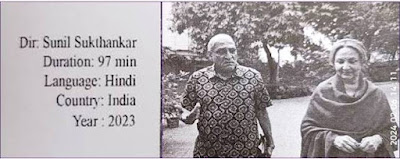Outhouse Hindi Film Review
On the face of it, Outhouse is about two elders, namely Nana, played by Agashe, and Aadima played by Sharmila Tagore who find themselves in conflict over the rightful owner of her grandson Neel’s pet poodle after it goes missing. But within that story arc, the writer, the late Sumitra Bhave, makes the film a gentle paean on urban loneliness, working women’s struggles, the precocity of children, and the fraught terrain of marriages and peripatetic lives.
The outhouse that forms the title is both, an addition to the house where Aadima lives and which she shared with her husband (albeit briefly), and also a metaphor for what does not fit into the new, contemporary world. And so it becomes, in turn, a storehouse of memories of Aadima’s late husband, a shelter for those who become an appendage to their families, and a refuge for those torn between conflicting loyalties like the pet poodle that forms the heart of the story. When Neel describes the outhouse as a room full of “rubbish”, Aadima is appalled but it underlines the dismissive treatment meted out to anything that does not reflect what is important and does not match the standards of what constitutes useful.
Two different generations of working mothers are showcased: Aadima, a working mom and grandmom (refreshingly for a film), and her daughter played by Sonali Kulkarni, a working mom. Both must balance family responsibilities and the work world. Tellingly, Aadima’s desire to take a long leave is humorously shot down by her client who wants her to think of writing her own stories as a digital artist. When her son-in-law played by Neeraj Kabi finally takes leave to spend time with his wife to staunch the differences that have erupted between them, it is the working grandmom who must adjust as she does. Even as Neel’s upbringing and his time management become a bone of contention between the couple, it is again left to Aadima to ensure Neel follows the timetable his father has set for him. What the film shows is that the expectations from the caregiver, especially women, never really cease and it is taken for granted she will accede to a prolonged stay from her grandson. In addition to her work and family responsibilities, Aadima must also juggle expectations that she should take sides and that her daughter wants her to be more supportive. The dialogue between the mother-daughter is very well written with imagined slights and behaviour patterns repeating themselves in an endless cycle. As much as women feel misunderstood, the film showcases that advancing age does not mean that Aadima is spared the scrutiny and judgment for everything she says or does.
The parallel track of the equation between father and son played by Mohan Agashe and Sunil Abhyankar is the most impactful because it has a distinct arc. It begins with a riveting scene of non-verbal communication, then overcomes bumps of property travails that threaten to become a cul de sac; and finally, both find a kind of closure as they bond together in the finale in search of the poodle. However, in terms of content, repeating the search, which has already taken place between one set of characters becomes a bit of a drag. But the wonderful performances alleviate it.
Besides the effective dialogue, it is the fantastic performances that lend depth to the simple storyline. The father and son are a standout and for Sunil Abhyankar to match veteran Agashe is a pleasure to watch. Sonali Kulkarni has also nailed it, as has Rajeshwari Sachdeva although they actually have more scenes on a video call. Sonali Kulkarni manages to convey the rushed conversations of a frazzled woman without in any way becoming a cliched trope of the harried mother in her demeanor. Rajeshwari Sachdeva can similarly convey the long relationship she has in hiring Aadima’s services in the relaxed, yet respectful way she engages with her. Neeraj Kabi also effectively conveys the fatigue, the self-obsession, and the realization that he needs to work on his marriage and cease the blame game. The neighbour Londhe, played by Pradeep Joshi is also a scene stealer and the nok-jhok between Nana and him is superb. The way Agashe at one point pronounces Londhe in Hindi so that it changes its meaning is outstanding. The child artiste Jihan Hodar is adequate. The bonding with his grandma does not quite come off but Sharmila Tagore with her ease manages to steady the ship. It is quite delightful to see the high-quality digital artwork of the comic strip, which seems to be a sporting dig at the hairstyles she sported as a heroine in her heyday.
While one does understand the need to underscore diversity, I do wish that the reference to Bengali roots and being progressive could be done away with as it's becoming something of a cliché with Sharmila Tagore. Just like Ratna Pathak Shah (bindhaas about sex) and Dia Mirza (good Muslim), there is a danger that we are beginning to also pigeonhole artistes when showcasing the characters as being progressive. Just watch Sharmila Tagore being Sumitra Patwardhan in the film Viruddh (2005) and you wonder why this film could not reimagine her as fitting into the Marathi milieu where the film is set and embracing it completely. She’d have been an absolute hoot!
The director Sunil Sukthankar is to be admired for showcasing the precocity of Neel without any attempt at making it seem "cute" and leaving that to the poodle! He also does not shy away from showing Aadima at one point giving Neel a sharp whack on the shoulder for calling her a rude name. The upper-middle-class milieu is also depicted authentically and kudos for this also goes to the cinematography by Dhananjay Kulkarni, sound designer Anmol Bhave, and editor Mohit Takalkar.
Shot on a tight budget and schedule, I do hope this very charming Hindi film gets a theatre as well as an OTT release, and not only at film fests. All said and done, it is the performances and writing in the hands of an able crew that counts.
This film review has been written by Madhuri Kamat, author of Flying with Grandpa, Bringing Back Grandpa, Burial of The Dead - Mystery in a Mohalla, Yudi Yudi Dharmasya: Mahabharat - Through the Eyes of Kunti, and the Marathi picture book Phulanche Bandhan with an English translation.




Comments
Post a Comment